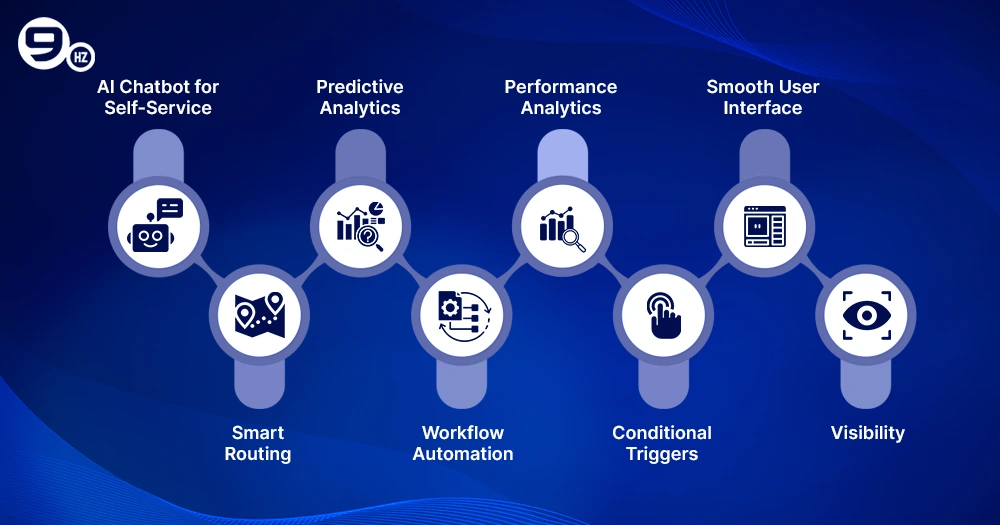Did you know, Gartner reports that 80% of the common customer service issues will be resolved through AI by 2029, which will eliminate the need for human intervention while reducing the overall operational costs by 30%. At the same time, 22% of the total service desk tickets can be resolved using AI with no additional costs. The statistics well-portray the fact that businesses are moving toward an artificial intelligence ticketing system to offer better, quicker, and personalized customer support.
The traditional ticketing system takes hours to generate tickets, categorize them with manual assistance, and then forward them to the concerned person. On the other hand, AI-powered ticketing systems automate tasks like ticket categorization, routing, and prioritization to provide instant responses.
In the era where personalized customer experience is key to a sustainable business future, an intelligent ticketing system has become a must-have for firms across industries. If you are also looking to build such a solution but wondering “how to build an AI-powered ticketing system”, you have landed on the right place.
In this blog, we will be talking all about the artificial intelligence ticket system, its features, development process, cost, timeline, and much more. Make sure you give a complete read to this article for informed decision-making.
What is the Artificial Intelligence Tickets System?
As the name suggests, an AI ticketing system is an innovative solution that streamlines and automates the process of optimizing customer inquiries. Tasks like ticket logging, categorization, and routing are performed without any human assistance or delay, forwarding the queries to the concerned person in no time.
The traditional ticketing system relied heavily on the manual sorting, assignment, and prioritization of customer tickets, which used to take a lot of time. At the same time, this method was prone to a lot of human errors. The traditional ticketing system often faced management difficulties during peak hours, leading to increased costs and delays.
Thus, AI ticketing systems automatically read the customer queries, prioritize the tickets on the basis of urgency, and cut the manual hard work to directly connect the relevant experts to the customers. This practice not only reduces the response time for customer support but also enhances the overall user experience, leading to brand loyalty.
Did You Know:72% of businesses have adopted AI for at least one business function
5 Reasons Why is AI Ticketing Automation Important
Artificial intelligence has been driving transformation across industries. The changing customer needs and highly competitive market make it highly important for businesses to establish an intelligence that can bridge the gap between brand and customers. Observing the real-time challenges and dynamic market conditions, AI ticket automation appears to be a need for modern businesses.
1. Automates Repetitive Tasks
The unproductive tasks like categorizing, sorting, and routing of tickets can be automated using an AI ticketing system. It helps enormously to reduce the dependency on the human workforce and thus eliminate the chances of errors. At the same time, it also helps to reduce the operational costs while leaving more time for the company’s resources to take part in crucial strategic planning. According to statistics, businesses have reported a 30% reduction in labor costs in customer service after the deployment of AI-powered solutions.
2. Changing Customer Expectations
In the highly competitive market, customers prefer to connect with businesses that can offer 24*7 customer support with an instant resolution promise. The absence of such an intelligent system often increases the ticket resolution time, which directly encourages the customers to look for alternatives. Therefore, it is important for businesses to implement an artificial intelligence ticketing system that can satisfy the changing customer expectations.
3. Actionable Insights
The traditional ticketing system can only categorize and route the customer tickets from one end to another. However, it can never draw the important insights without delaying the process. On the other hand, intelligent ticketing systems are capable of categorizing and routing the tickets while also reading the queries during the process. It helps businesses to identify the most common customer queries, improvement areas, and customer experience with a particular product or service.
4. Scalability
Globalization and digitization allow brands to connect with customers from around the world without investing in physical infrastructure. However, the increased number of query tickets and customer feedback is inevitable during business growth. A traditional customer support system can never be scalable to synchronize with changing business requirements. Therefore, it becomes highly crucial to integrate an AI-powered ticketing system that can adapt to changing business needs and scale accordingly.
5. Faster Response with High Efficiency
Intelligent ticketing systems have the capability to cut down average ticket resolution time by 90% without compromising the efficiency and customer experience. Not only does it save time, but it also allows the elimination of the chances of human errors and misunderstandings. The smart ticketing system makes sure that the query is resolved by a licensed professional for the best results. AI has reportedly fostered a 47% faster response time in the customer service industry.
8 Key Features of an AI-Powered Ticketing System
Features are always the core unit that determines the efficiency and usability of any digital solution. At the same time, it is important to have the right features in the product in order to transform the vision into a reality and achieve the defined goals. Therefore, we have enlisted some of the must-have features for an AI-powered ticketing system-
1. AI Chatbot for Self-Service
The ultimate aim of an intelligent ticketing system is to offer instant resolutions to the customers’ queries. For the same reason, it is important to have an AI-powered chatbot that allows users to simply define their question and get an instant but personalized answer. The common queries can be resolved by the customers themselves, thus eliminating the need to generate tickets and seek human support.
2. Smart Routing
An AI customer service agent can never be intelligent without a smart routing system that can read the customer queries, generate the ticket, categorize it, and forward it to the right person without failing. At the same time, it also analyzes the skills, availability, and capacity of the available resources to give an accurate estimation of the time that will be required to solve the particular query.
3. Predictive Analytics
An artificial intelligence ticketing system must have predictive analytics capabilities to accurately assess the increasing flow of queries. It helps businesses to optimize resource allocation, manage workflows, and improve employee strength during the peak hours.
4. Workflow Automation
Workflow automation is a must-have feature for an intelligent ticketing system that helps automate repetitive tasks throughout the lifecycle. Also, the AI ticketing system is designed to keep the real-time tracking of the ticket to update the status, send notifications, and inform the customers about their queries without human interference.
5. Performance Analytics
It is important for an AI-powered ticketing system to offer profound insights into the business key performance indicators. For instance, the smart system must have a feature that allows businesses to monitor the improvement in their service quality and customer experience. It will help the businesses to calculate the effectiveness of the new system and take the strategic initiative.
6. Conditional Triggers
As the name suggests, a conditional trigger is the feature that allows the smart ticketing system to perform an action in particular circumstances. For instance, if a customer has not responded to a ticket within 7 days of last interaction, the system can send a reminder email asking the customer if they still need assistance. At the same time, this feature also helps to set a particular time limit after which the ticket is closed so that unnecessary queries can be eliminated from the workflow.
7. Smooth User Interface
An AI-powered ticketing system should have a smooth and easy-to-use interface. It helps the employees and customers with limited technical exposure to easily access all the features and functionalities of the system while leveraging the most out of the innovative solution. At the same time, a seamless UI enhances the customer experience by navigating them through the pages without having to scroll through the entire software.
8. Visibility
The AI ticketing systems are designed to reduce the dependency on the human workforce. However, your ticketing system must offer complete visibility to the customer support team about the query processing during the entire lifecycle. It will allow them to personally entertain the complex and confidential queries if the autonomous system is not designed for the same. At the same time, it increases the reliability by making sure that end controls are in the professional’s hands.
5 Benefits of Artificial Intelligence Ticketing System Implementation
An AI-powered ticketing system not only allows the firm to reduce the human efforts on repetitive tasks, but it also provides many other benefits as well that satisfy all the investment required for the development.
1. Faster Ticket Resolution
With an intelligent AI ticketing system, the need to manually assess the queries, put them in the relevant category, and forward them to the concerned professionals is eliminated. The system is capable enough to read, categorizing, and forwarding the query within seconds. At the same time, it can even answer the common queries by itself, thus offering faster ticket resolution.
2. Reduced Operational Costs
Intelligent ticketing systems save a lot of operational costs for a business. First of all, it eliminates the need for a human workforce in repetitive tasks and thus lowers the labor costs. At the same time, it also eliminates the chances of human errors, which reduces the chances of recreation of the same queries. Also, the smart system allows the available workforce to handle more queries in the least time to increase their productivity. So, there is no need to hire additional staff.
3. 24/7 Availability
The AI ticketing system makes sure that you don’t rely on multiple teams to offer 24*7 customer support availability. The solution is designed to work around the clock, with efficiency increasing with time. The modern ticketing system allows businesses to entertain queries from different time zones without hiring a support team according to time shifts.
4. Improved Accuracy
Sentiment analysis + predictive ticket resolution. The new AI-powered ticketing system is equipped with the sentiment analysis capability. Thus, it can well understand the customers’ emotions in the queries to offer a personalized resolution in the least time. At the same time, it also offers predictive ticket resolution that allows the firm to accurately identify solutions to common queries and offer instant responses.
5. Better Customer Experience
Offering a good customer experience is highly crucial in the competitive landscape. Therefore, implementation of an AI ticketing system allows the customers to get fast query resolution, become self-dependent for common issues and queries, and reach out to the concerned professionals.
How to Build an AI-Powered Ticketing System? (Step-by-Step Process)
Building a smart customer query routing and resolution software is a highly complex process, and thus, it is crucial that you hire the right technology partner that offers the best AI development services. However, the process of development might change from one team to another; the overall workflow defined below is shared mutually by all the development partners-
1. Define Clear Project Objectives
The process begins with defining the project objectives and identifying the challenges that you wish to overcome by building an AI-powered ticketing system. The issues can be reducing the response time, automating the workflow, lowering reliance on the human workforce, and much more. It will help you to prioritize the features and thus navigate a personalized roadmap to achieve the objectives.
2. Gather and Prepare Data
The AI ticketing system is trained on the existing customer service database of the company so that it can manage the queries and clients accordingly. Therefore, the second phase is dedicated to gathering the relevant data from the knowledge base and historic ticket management system, fine-tuning the information to eliminate inaccuracies, and transforming it into structured datasets to ensure reliability.
3. Design the System & Create a Prototype
This is the third stage of intelligent ticketing system development in which the designers curate the intuitive user interface and overall navigation of the software. Tasks like theme selection, product designing, choosing the right colors, and adding the features (not functional yet) are carried out. At the same time, a prototype is developed that gives a fair idea to the client about software navigation so that they can provide their feedback.
4. Train the AI Model
This is one of the most crucial steps for AI-powered ticketing system development. At this phase, the software is fed with all the gathered data so that it can know about the types of queries and the relevant solutions. At the same time, tasks like backend development, framework implementation, and third-party integrations are also ensured at this step, which makes all the features functional.
5. Conduct Quality Testing
As the name suggests, this step is dedicated to conducting the numerous quality tests that help ensure that only the best software version is deployed for the target audience. The quality tests include unit testing, functional testing, automated testing, manual testing, and much more.
6. Deploy the Ticketing System
This is the final step where the intelligent ticketing system is deployed at the client organization so that it can be used by the employees and customers. It is also ensured that the existing technology infrastructure is compatible with the new ticketing system, and required updates are made. Moreover, the training is provided to the relevant stakeholders to make them familiar with all the features.
7. Ongoing Maintenance & Support
This is the ongoing process that helps to ensure that the AI-powered ticketing system performs well in the live environment. At the same time, our developers also monitor the changing business needs to integrate the required features. Periodic updates are provided to the software to eliminate the chances of errors and bugs.
Cost of Developing an AI Ticketing System
The development cost of building an AI customer service agent generally falls in the range of $25,000-$300,000. However, the cost of development is highly influenced by a range of factors, which makes it challenging to estimate the right amount. For instance, building an advanced ticketing system for a small firm with a limited number of queries will cost less as compared to building software for a large enterprise that receives hundreds of queries every hour.
Here is a glance at the development cost structure for an AI ticketing system-
| Level | Features Included | Estimated Cost | Timeline |
|---|---|---|---|
| MVP / Basic |
|
$25,000 – $50,000 | 3 – 5 months |
| Mid-Level |
|
$50,000 – $120,000 | 6 – 9 months |
| Enterprise-Grade |
|
$120,000 – $300,000+ | 9 – 15 months |
Factors Affecting Artificial Intelligence Tickets System Cost-
1. Project Complexity
More complex system requires a huge investment due to the fact that they need more human resources, skills, time, technology infrastructure, etc. For example, if you want to build a simple solution that can offer a limited response to a particular type of query, it will be highly cost-efficient. On the other hand, building an advanced solution that performs sentiment analysis to provide a personalized response for different types of queries will cost much higher.
2. Design Customization
There is no doubt that every ticketing system comes with a basic design. However, if you prefer to add additional components, interactive elements, and paid themes in the user interface, it can increase the AI-powered ticketing system costs.
3. Features and Functionalities
You should never compromise on the software features to save some dollars. However, it is also important to understand that the number of features directly increases the development costs. Therefore, make sure that you prioritize the features to pay only for what you really need.
4. Location of Development Team
The location of an AI chatbot development company plays a big role in determining the intelligence ticketing system development cost. Hiring the software developers from countries like the USA, UK, Australia, and Europe will cost you more than twice as compared as hiring the software developers from Asian countries like India.
5. Third Party Integrations
APIs and third-party services are integrated into the software to bring particular core competencies into the software. While some of the platforms offer these services for free, others might charge a fee. Therefore, integrating the third-party services into the software is often considered an additional cost.
6. Maintenance and Support
It is highly important to opt for technical support after the deployment of the software. It ensures that you can mitigate the bugs and errors in the system before they can impact your operational process. However, the post-deployment maintenance and support are often paid services that add on to the overall development cost.
How Does an AI Ticketing System Work?
The working mechanism of an AI ticketing system is mainly dependent on technologies like natural language processing, machine learning, and customer support automation. To make the entire process easy to understand, let’s break it into four stages-
1. Query Intake and Understanding
First of all, the AI-powered ticketing system takes the query from the user and utilizes the natural language processing capabilities to analyze the text. This entire process is carried out to understand the user’s intent, sentiment, and identify the keywords used by the customers. The system is advanced enough to understand the meaning even when the customer has used different phrases.
2. Categorization & Forwarding
In the next step, the software uses the machine learning capabilities to analyze the vast amount. It helps to categorize the tickets on the basis of topic, urgency, and question. As soon as the classification of the query is completed, the ticket is forwarded to the concerned professionals so that a personalized and insightful response can be curated.
3. Query Resolution and Response
This is the third stage, where different query resolution concepts are deployed. For example, chatbots and virtual agents are used to solve the common and straightforward queries. Thus, it doesn’t require any support from a human professional.
Agent assistance is deployed for the complex queries where the AI helps human agents by providing response templates, knowledge base articles, and relevant customer history. Therefore, it becomes easier for the human agents to provide a satisfactory response.
The third one is proactive problem solving, where the predictive analytics technology forecasts the ticket volumes and trends to optimize the resources accordingly and enhance the overall efficiency.
4. Continuous Learning and Improvement
The AI ticketing system continues to learn from the regular interaction with the customers. This information is then used by the software for self-improvement. Therefore, the performance and quality of an AI-powered ticketing system always improve with time.
5 Challenges of Ticket Systems Without AI
There are several challenges that are efficiently addressed using an intelligent ticketing system. A business ignoring the need for a robust AI customer service agent is always prone to the following challenges-
1. Manual & Inefficient Processes
A business using the ticketing system without AI advancements always struggles with manual classification and assignment of the queries, which makes it time time-consuming and error-prone process. At the same time, repetitive tasks are also performed by the human workforce, which significantly contributes to low productivity.
2. Slow Response and Resolution Times
An AI-powered ticketing system is multiple times faster as compared to a traditional ticketing system. From reading the query to categorization and assignment to the relevant department and professional, everything takes much time. Therefore, the resolution time increases for the query, which directly impacts the customer experience with the brand.
3. Lack of Context and Continuity
A manual ticketing system heavily depends on the human professional. Thus, it becomes challenging for the workforce to individually read every query and understand the context or tone of the question. The situation leads to a lack of personalized resolution and response. At the same time, continuity of the query resolution can not be expected with a manual ticketing system, as it is not possible for a human agent to memorize thousands of queries and offer support accordingly.
4. Limited Data Insights
The ticketing solution without AI prowess can never structure the data like query volumes, customer experience, areas for improvement, and customer experiences. Therefore, it becomes highly challenging for businesses to take data-driven decisions in the absence of optimized reports and insights into the customer experience with the brand or particular product, or service.
5. Inconsistent Customer Experience
The manual ticketing system offers a delayed response without any accurate estimation of the approximate resolution time. Also, the lack of a personalized response sometimes impacts the quality of resolution. The traditional AI ticketing system doesn’t establish a periodic interaction protocol with the customers. All these things significantly impact the overall customer experience.
3 Real-World Examples of AI Ticketing System Use Cases
Despite the AI ticketing system being a new concept, businesses worldwide are already using the innovation to redefine the meaning of customer support for their clients and stakeholders. Having a glance at such cases helps get a clear vision about AI ticketing system implementation-
1. Bank of America Resolving Queries within Seconds with Erica
Bank of America, one of the largest financial institutions in the USA, has launched a virtual financial assistant named “Erica” that enables customers to get instant assistance on their banking needs. Whether it is getting the transaction insights or bill payment, Erica covers it all. The new ticketing and customer support system is trained using advanced AI and NLP technology that helps to process different media formats like voice commands, texts, and more.
Impact
Since the implementation of Erica by Bank of America, 78% of clients have had their queries resolved within 41 seconds. At the same time, the system has sent more than 7000 birthday wishes to customers, establishing a stronger relationship with the clients.
2. Bulletproof Cuts 50% Query Handling Time.
Bulletproof is a leading wellness brand that relies heavily on its e-commerce offering to generate revenue. The firm implemented an AI-powered ticketing system that helps the firm to reduce inbound request volumes, enhance first contact resolution, and automate its workflow.
Impact
The company reported a 50% reduction in handling time for its customer queries due to the automated routing and unified view feature. At the same time, first contact resolution has increased by 15% which means the customers don’t have to generate a second ticket for the same query.
3. Brex Fosters 3x faster response time with Intelligent Ticketing System
Brex is a fintech company that assists growing teams and startups. The firm struggles with high email volumes for customer support and external operations. It led the firm to implement an advanced ticketing system that could take the follow-ups, reduce the response time, enhance communication flow, and keep control over the inboxes.
Impact
After the implementation of the smart ticketing system, the company experienced a 3x faster response time across the partners and customer emails. At the same time, the firm claimed to save 3.5 hours per user per week in managing the emails and inboxes.
Future of Artificial Intelligence Tickets in Customer Support
Technology never took a pause in evolution, which means the future of AI in the ticketing system and customer support arena can be something more advanced than we can presume today. Looking at the effectiveness of modern AI ticketing systems gives enough confidence that an intelligent ticketing system has a lot to unfold-
1. Recurring Task Automation
Observing the working mechanism of the real-time ticketing system, there is no doubt that the upcoming ticketing system will focus on automating the recurring tasks. The new solutions will be trained on huge datasets that will allow the AI model to learn about customers, their queries, relevant resolutions, and more. Therefore, the reliance on the human support system will decrease as the AI will be enhancing the speed, accuracy, and efficiency of the entire customer service department.
2. Personalized Customer Support
With the AI companies exploring the cloud solution for better customer experience, it is anticipated that brands will soon be able to launch a ticketing system that is designed for personalized customer support. With this new concept, the AI customer support agent will have all the relevant information about the individual customer, which will eliminate the need for the end user to share their basic details. All they have to do is define the issue and get an instant resolution.
3. Increased Technical Proficiency
Most of the smart ticketing systems in modern times are designed to analyze the query and route it to the concerned professional. However, the future might introduce an even advanced ticketing system with exceptional technical proficiency. It means that even complex queries and problems will be solved using the AI bots, which will reduce the reliance on the human workforce while enhancing operational speed.
4. Enhanced Customer Experience
One of the biggest aims of brands behind implementing the intelligent ticketing system is to enhance the customer experience. So, new features can soon be launched in this software that contribute toward an even better customer experience. It might include enabling a new level of self-service, customized content, customer behavior prediction, real-time decisioning, assistance throughout the customer journey, and more.
Why The NineHertz for Artificial Intelligence Ticket System?
There is no doubt that an AI ticketing system offers hundreds of advantages to the brand, driving an excellent return on investment. However, it is highly important to hire an experienced artificial intelligence development company to leverage the benefits.
The NineHertz is a renowned name, offering high-quality artificial intelligence development services according to real-time business needs. We hold an experience of 15+ years in the landscape, which allows us to offer cost cost-efficient AI solution without compromising the project quality. Here are our core competencies, which make us the first choice of hundreds of businesses worldwide-
1. AI Specialization
There are very few AI experts who know the inside-out of industry 4.0 technologies. We have a team of 250+ skilled engineers who excel in artificial intelligence, machine learning, natural language processing, data analysis, predictive analytics, AR/VR, blockchain, and metaverse. Our highly proficient experts allow us to curate innovative solutions that align with real-time business needs and mitigate the challenges to unlock the path to sustainable growth.
2. Domain Expertise
The ticketing system needs to be personalized according to particular industries and niches. For instance, a company offering apparel and fashion items needs to have a ticketing system that can offer more instant and self-service capabilities to the customers. On the other hand, a telecom company will require software that can connect the client to the right professional. Therefore, we have dedicated domain experts who help us to understand particular domain challenges and curate the solution accordingly.
3. Cost Efficiency
The NineHertz is partnered with businesses of different sizes and investment capabilities. With a vision to make AI accessible to everyone, we offer cost-efficient AI development services that allow small and medium-sized businesses to build advanced solutions for their operations. Our years of experience allow us to control the development cost without impacting the overall outcome or project quality.
4. Least Time-to-Market
We understand the importance of efficient customer service for a brand. Thus, we make sure that the intelligent ticketing system is designed, trained, and deployed in the least time. After the thorough analysis of the business needs, we curate the personalized roadmap and ensure that the final solution is implemented within the defined timeframe.
5. Non-Disclosure Agreement
AI projects require a lot of data and information sharing between the stakeholders and teams. Therefore, we sign a non-disclosure agreement with our client, which ensures that information related to the project and client is not shared with any third party without the mutual consent.
Conclusion
It can be concluded that artificial intelligence ticket systems are the future of customer support automation. Whether it is resolving the queries at the first interaction, routing the ticket to the right professional, or establishing a strong relationship with the client, the smart ticketing system is capable of everything. In the fast-paced business environment, customers prefer to connect with a brand that offers instant and personalized support services. Therefore, businesses overlooking the need for an advanced system are always at risk of losing competitive advantages among their peers.
If you are also looking to build your own AI-powered ticketing system, we invite you for a free consultation. Partner with The NineHertz to build your intelligent ticketing system today.
Frequently Asked Questions (FAQs)
Can AI replace customer support agents?
Answer- AI is designed to assist the customer support agents in better service offerings and establish a stronger relationship with the clients. Instead of substituting the human support agent, it helps to reduce human interference in repetitive tasks to enhance the overall efficiency and accuracy. At the same time, it also ensures that tickets and queries are assigned to the right customer support agent according to the customer’s problem.
How much does it cost to build an AI ticketing system?
Answer- It costs anywhere between $25,000-$200,000 to build an AI ticketing system. However, the exact price is highly volatile as it depends on a range of factors like data availability, project complexity, number and type of features, technology integration, third-party integration, customization, and much more.
Great Together!










